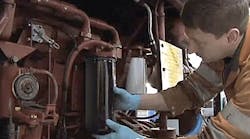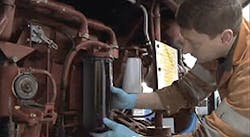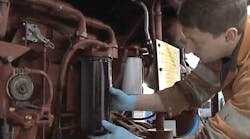One common challenge for all fleet managers is finding a way to maintain optimum productivity with minimum time and money spent on repairs. One step to avoiding unexpected maintenance is having a preventive maintenance plan in place that includes equipment management plans and life-cycle analysis.
However, any preventive maintenance plan can lead to failure if it doesn't include taking all necessary steps to protect the heart of the fleet's heavy-duty vehicles — the engine. To avoid catastrophic engine failures, maintenance managers and mechanic must understand the filters that protect that engine, including when to change those filters and which filters are best for their respective applications.
Oil service intervals, pre-determined by engine manufacturers, are designed to provide maximum engine protection under a wide variety of guidelines. However, many equipment owners are looking to extend oil service interval time, and that can include the filter.
Oil filter maintenance starts with knowing when to change the filter. A rule of thumb that operators can follow is to change the filters every time the vehicle's oil is changed to ensure peak operational efficiency. It is also recommended that a heavy-duty oil filter be changed every 20,000 miles, although innovative new filter designs have enabled heavy-duty fleet owners to push that interval closer to 40,000 miles.
Right filter
Extending oil drain intervals not only requires the right filter, but the right plan. Any decision to extend oil drain int ervals must be based on oil analysis and adhere nce to OEM criteria for acceptable oil-operating properties. Astute fleet managers are utilizing online calculators like the TRT (Time Release Technology) Value Calculator to help them understand current maintenance costs associated with oil changes. Understanding a filter's capabilities is critical to fully protecting the engine.
It is critical to capture both the large and small particles that pass through the filter, and that means focusing on micron rating. A filter's micron rating represents the size of a particle that can be removed from the fluid passing through it. For example, an oil filter could be rated as a “10-micron” filter,” which means it has the capability to capture particles as small as 10 microns (the equivalent of talcum powder) or larger. Different filters are more efficient at removing different-sized particles, making filter selection an important part of the maintenance process.
Various filters are available for heavy-duty vehicles but when it comes to protecting the engine, the focus must be on selecting the right heavy-duty oil/lube filter. Owners can choose between a standard oil filter and an extended-life filter. Extended-life filters keep oil flowing smoothly across the media while delivering extremely high filter efficiency over a longer period of time. They have one-and-a-half times the filter capacity of cellulose filters with a contaminant-holding capacity of 90 grams versus 60 grams for conventional filters.
Extended-life filters also feature higher efficiency, which means fewer contaminants passing through the filter media. They protect engine parts by permitting oil to flow freely during cold engine starts. Conventional filters typically have a 30-gram contaminant-holding capacity, but extended-life filters offer a 15-gram contaminant-holding capacity.
Certain extended-life filters can provide a steady release of additives over time to neutralize oil acidity and limit oil oxidation, giving fleet managers the opportunity to increase oil change intervals in acid-challenged engines and, in the process, reduce costs.
Today's fleet managers have made preventive maintenance a priority to keep fleets up and running. Those preventive maintenance plans must include analyzing or, in some cases, re-evaluating the filtration systems they have in place for protecting their heavy-duty vehicles' engines and other system components. When it comes to effectively managing maintenance, companies must invest in the right filter technology — or watch their engines, and investment, go up in smoke. ♦
Pete Haskell is director of heavy duty sales for Luber-finer filtration products. He can be reached at [email protected].





